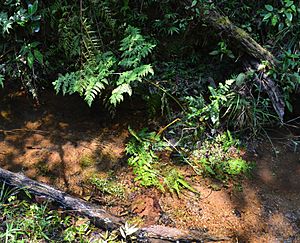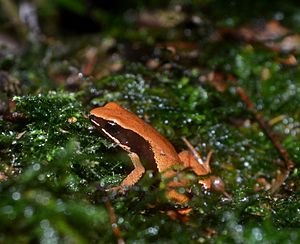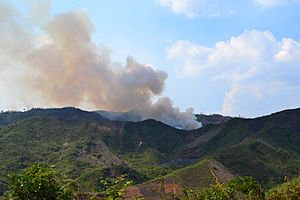Mantella facts for kids
Quick facts for kids Mantella |
|
|---|---|
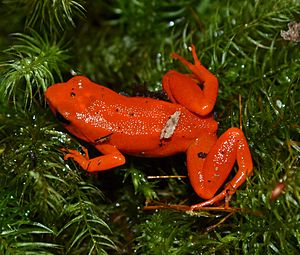 |
|
| The Golden mantella (Mantella aurantiaca) from Madagascar. | |
| Scientific classification |
|
| Kingdom: | Animalia |
| Phylum: | Chordata |
| Class: | Amphibia |
| Order: | Anura |
| Family: | Mantellidae |
| Subfamily: | Mantellinae |
| Genus: | Mantella Boulenger, 1882 |
| Type species | |
| Dendrobates betsileo Grandidier, 1872
|
|
| Diversity | |
| 16 species | |
Mantella frogs, also known as golden frogs or Malagasy poison frogs, are a special group of frogs found only on the island of Madagascar. These frogs are famous for their bright colors, which warn predators that they might be poisonous. They are active during the day and live on land. Each species has its own unique colors or patterns.
Contents
Amazing Similarities
Mantella frogs are a cool example of convergent evolution. This is when different animals develop similar features independently. Mantella frogs look a lot like poison dart frogs from Latin America. They are similar in size, looks, and even some behaviors. But don't be fooled! They are not related at all.
When these frogs were first discovered in the late 1800s, scientists like Alfred Grandidier thought they were part of the Dendrobates genus, just like the poison dart frogs. This was because they looked so much alike. However, in 1882, a scientist named George Albert Boulenger created a new group, the Mantella genus, for these unique frogs. He named one species, Baron's mantella (Mantella baroni), after Rev. Richard Baron, a missionary and botanist who collected many specimens in Madagascar.
Even after Mantella was created, some old books still incorrectly listed them with poison dart frogs. It took a while for everyone to agree on their proper place in the animal kingdom.
In the early 1900s, more Mantella species were found. The most famous one, the golden mantella (Mantella aurantiaca), was described in 1900 by François Mocquard. This frog is known for its bright, uniform yellow color.
What They Look Like
All Mantella frogs are quite small, usually growing to be about 0.7 to 1.2 inches (18 to 31 mm) long. Female frogs are usually a bit bigger than males.
These frogs are often compared to poison dart frogs because they both use bright colors to warn predators. This defense is called aposematism. Their colors can be green, red, orange, yellow, blue, brown, white, and black. These bright colors often mean the frog has some toxic chemicals in its skin. For example, the golden mantella looks very similar to the golden poison frog because they are both bright yellow.
Mantella frogs get these toxic chemicals from the insects they eat. They can even keep these chemicals in their skin for years, even if they are in captivity!
Most Mantella frogs also have special patterns on their bellies. Their undersides are usually black, dark gray, or brown with blue or white spots or blotches. Their throats also have blue or white markings. These belly patterns can help tell similar-looking species apart, like Baron's mantella and the Malagasy mantella.
Mantella frogs have smooth or slightly bumpy skin. They have small, angled heads with big, noticeable eyes. Their fingertips are slightly wider, similar to poison dart frogs. The climbing mantella (Mantella laevigata) has especially large finger pads, which help it climb. They have four fingers on their front legs and five toes on their back legs, and none of them have webbing.
Where They Live
Mantella frogs live only on the island of Madagascar and its smaller islands nearby. They can be found in many different places, like rainforests, swamps, bamboo forests, and even along streams and in wet canyons.
Some Mantella species, like Ebenau's mantella (Mantella ebenaui) and brown mantella (Mantella betsileo), are very good at adapting. They have even been found living in unusual spots, like on piles of rubbish, where they eat flies!
Local Color Differences
Sometimes, Mantella frogs from different areas can have slightly different colors. For example, some yellow mantella (Mantella crocea) and black-eared mantella (Mantella milotympanum) frogs can be green, red, and yellow. This makes it hard to tell them apart just by looking at their colors.
Baron's mantella (Mantella baroni) can also look very different. Some populations are almost entirely green with black spots, instead of their usual orange and black stripes.
Species of Mantella Frogs
There are currently 16 known species of Mantella frogs, divided into five main groups. Most species can be identified by their unique color patterns. However, as mentioned, some local variations can make identification tricky.
| Subgenus | Image | Scientific Name | Common Name | Where They Live |
|---|---|---|---|---|
| Mantella laevigata group |  |
Mantella laevigata Methuen & Hewitt, 1913 | Climbing mantella | Madagascar |
| Mantella manery Vences, Glaw & Böhme, 1999 | Marojejy mantella | Madagascar | ||
| Mantella betsileo group | 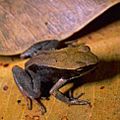 |
Mantella betsileo Grandidier, 1872 | Brown mantella | Madagascar |
 |
Mantella ebenaui Boettger, 1880 | Ebenau's mantella | Madagascar | |
 |
Mantella expectata Busse & Böhme, 1992 | Blue-legged mantella | Madagascar | |
 |
Mantella viridis Pintak & Böhme, 1988 | Green mantella | Madagascar | |
| Mantella betsileo group |  |
Mantella bernhardi Vences, Glaw, Peyrieras, Böhme & Busse, 1994 | Bernhard's mantella | Madagascar |
| Mantella cowanii group |  |
Mantella cowanii Boulenger, 1882 | Cowan's or harlequin mantella | Madagascar |
 |
Mantella baroni Boulenger, 1888 | Baron's mantella | Madagascar | |
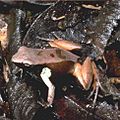 |
Mantella haraldmeieri Busse, 1981 | Harald Meier's mantella | Madagascar | |
 |
Mantella nigricans Guibé, 1978 | Guibe's mantella | Madagascar | |
| Mantella aurantiaca group |  |
Mantella aurantiaca Mocquard, 1900 | Golden mantella | Madagascar |
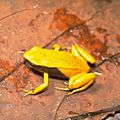 |
Mantella crocea Pintak & Böhme, 1990 | Yellow mantella | Madagascar | |
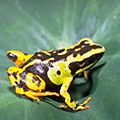 |
Mantella madagascariensis Grandidier, 1872 | Malagasy mantella | Madagascar | |
 |
Mantella milotympanum Staniszewski, 1996 | Black-eared mantella | Madagascar | |
 |
Mantella pulchra Parker, 1925 | Beautiful mantella | Madagascar |
Threats to Mantella Frogs
Many Mantella species are in danger because their homes are being destroyed. This happens due to farming, cutting down trees for wood or charcoal, fires, and growing human towns. Mining also harms their habitats.
Another problem is that some Mantella frogs are collected too much for the international pet trade. Because of these threats, some species are listed as least concern, near threatened, vulnerable, endangered, or even critically endangered by the IUCN Red List of Threatened Species. This list helps track which animals need protection.
Scientists have also found a fungus called Batrachochytrium dendrobatidis (or Bd) in some Mantella frogs. This fungus can be very dangerous for amphibians. So far, it hasn't caused big problems for frogs in Madagascar, but scientists are watching it closely.
Gallery
See also
 In Spanish: Mantella para niños
In Spanish: Mantella para niños
 | Tommie Smith |
 | Simone Manuel |
 | Shani Davis |
 | Simone Biles |
 | Alice Coachman |


